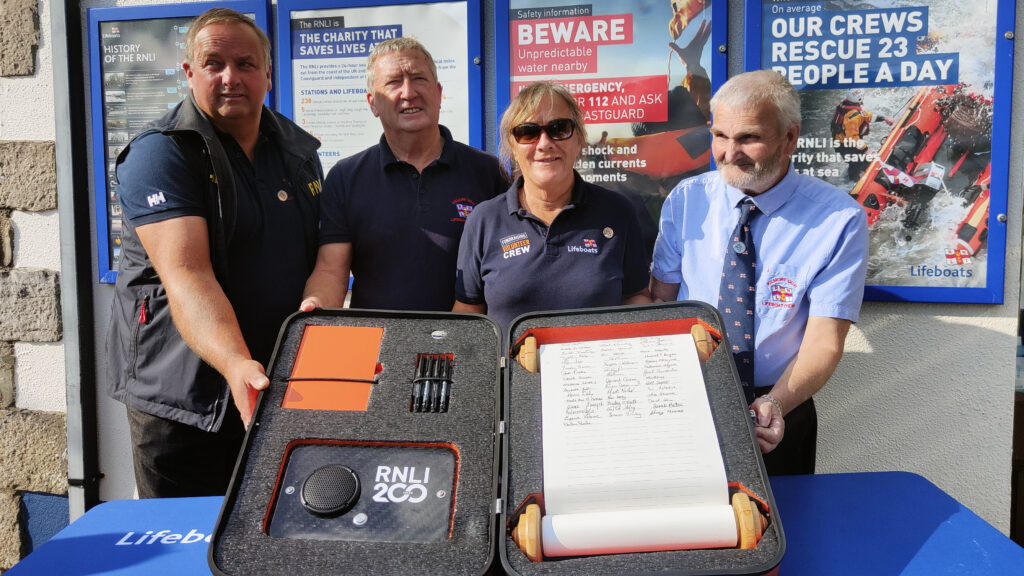Representatives from Kilmore Quay RNLI lifeboat station took part in the next stage of the RNLI’s ‘Connecting our Communities’ relay-style event – one of the ways in which the charity is marking its 200th anniversary in 2024.
The event sees a scroll, bearing the RNLI pledge, being passed through RNLI communities – lifeboat stations, lifeguard units and fundraising branches – around the UK and Ireland and being signed by representatives at each location on its route.
The pledge reads: ‘Whoever we are, wherever we are from, we are one crew, ready to save lives. We’re powered by passion, talent and kindness, like generations of selfless lifesavers before us. This is our watch, we lead the way, valuing each other, trusting each other, depending on one another, volunteering to face the storm together. Knowing that, with courage, nothing is impossible. That is what has always driven us to save every one we can. It’s what makes every one of us a lifesaver.’
Beneath the pledge, printed in seven languages (English, Irish Gaelic, Welsh, Scottish Gaelic, Ulster Scots, Manx, and Cornish), it says: ‘Signed in 2024 by representatives of the RNLI’s lifesaving communities, on behalf of all who strive to save every one.’
At Kilmore Quay RNLI lifeboat station the scroll was signed by Coxswain Eugene Kehoe, Shop Manager Johnny Moore, fundraiser Teresa Hinchy and water safety officer Declan Roche
Over the course of seven months, the five-metre-long scroll will pass through 240 RNLI locations around the UK and Ireland before finishing its journey in October at Douglas on the Isle of Man, which was home to the RNLI’s founder, Sir William Hillary. By this time it will carry around 700 signatures.
The scroll has been made bespoke, involving RNLI craftspeople and using materials of significance to the charity. The wooden handle has been made by a carpenter from the RNLI’s All-weather Lifeboat Centre in Poole (where the charity builds and maintains its all-weather lifeboats), using wood from an old flagpole from Ramsey lifeboat station on the Isle of Man. Apprentices from the RNLI’s Inshore Lifeboat Centre on the Isle of Wight have made the protective fibreglass casing and set the scroll spindles and accessories into the case.
The scroll began its journey on Monday 4 March 2024, at a Service of Thanksgiving at Westminster Abbey to mark the charity’s official 200th anniversary, where it was signed by RNLI President, HRH The Duke of Kent, as well as the Archbishop of Canterbury, the Dean of Westminster, the RNLI’s Chair and the RNLI’s Chief Executive.
Anjie Rook, RNLI Associate Director, who is overseeing the RNLI’s 200th anniversary programmes, says:
‘The Connecting our Communities relay is one of the most significant events of the RNLI’s 200th anniversary year as it’s all about our people. For 200 years, it is people who have made the RNLI what it is – from our brave lifesavers who risk their lives to save others, to the committed fundraisers and generous donors who fund our lifesaving work.
‘We asked our communities to express interest in participating in this event and we have been overwhelmed by the response – we’re thrilled to have representation from our stations, lifeguard units and fundraising branches across the UK and Ireland.
‘Everything about the scroll – from the design and materials, to the wording printed on it and the locations it’s travelling to – reflects the communities we serve. By the end of the relay we will have an important document which will become part of the charity’s history and a significant snapshot of the charity as it stands at 200 years old.’
Ford are providing an All-Electric E-Transit van to transport the scroll on its journey. When the seven-month-long journey is complete, the scroll will be displayed in the RNLI College in Poole, where the charity’s lifeboat crews and lifeguards are trained.
Founded on 4 March 1824 following an appeal from Sir William Hillary, who lived on the Isle of Man and witnessed many shipwrecks, the RNLI has been saving lives at sea for 200 years. Since the charity was founded, the charity’s lifeboat crews and lifeguards have saved over 146,000 lives.
Two centuries have seen vast developments in the lifeboats and kit used by the charity’s lifesavers, and the charity’s lifesaving reach and remit has also developed over the course of 200 years. Today, it operates 238 lifeboat stations around the UK and Ireland, including four on the River Thames, and has seasonal lifeguards on over 240 lifeguarded beaches around the UK. It designs and builds its own lifeboats and runs domestic and international water safety programmes.
While much has changed in 200 years, two things have remained the same – the charity’s dependence on volunteers, who give their time and commitment to save others, and the voluntary contributions from the public which have funded the service for the past two centuries.
Throughout its 200th anniversary year, the charity is running events and activities to remember its important history and celebrate the modern lifesaving service it is today, while hoping to inspire generations of future lifesavers and supporters.
For further information about the RNLI’s 200th anniversary, visit RNLI.org/200.


